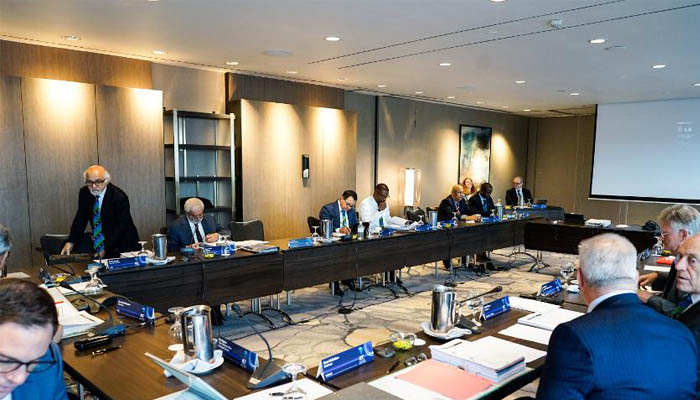New qualification pathway for ICC Men's Cricket World Cup approved
The International Cricket Council (ICC) Board today unanimously approved a new ICC Men’s Cricket World Cup qualification pathway at the conclusion of a week of meetings in Singapore.
The International Cricket Council (ICC) Board today unanimously approved a new ICC Men’s Cricket World Cup qualification pathway at the conclusion of a week of meetings in Singapore.
From 2019, a new simplified 50 over league-based qualification structure for the ICC Men’s Cricket World Cup, will be introduced that will see the amount of cricket played as part of the Road to India 2023 rise to 372 matches across a 2-3 year qualification period. A full overview of the new structure can be found attached.
In the interests of growing the game globally through the shortest format, the Board also agreed to relax the criterion for entry to both men’s and women’s teams in the World T20 qualification pathway. To enter the pathway, Members now only require eight unique domestic teams playing a minimum of five matches over the last two years, as opposed to 10 previously. Additionally, the entry fee for each Member to participate has been abolished.
Following consultation with Members, it has been agreed in respect to multi-day cricket, that the ICC will now seek Expressions of Interest from Members who have previously competed in the I-Cup and / or World Cricket League Championship, who are keen and committed to playing the multi-day format. Following this, a structured multi-day competition on a cost-sharing basis will be proposed giving Members the choice of playing longer form cricket.
ICC Chief Executive David Richardson said: “To date the World Cricket League has played an important role in improving standards in Associate Member cricket, but feedback from our consultation with Members clearly articulated the need for more frequent playing opportunities and greater certainty over when they would be playing.
“The new structure significantly increases the number of matches and competitive playing opportunities for our Members as well as shortening the whole qualification process to two and a half years, when previously it was six. There is a clear pathway now for teams looking to qualify for the ICC Men’s Cricket World Cup.
“T20, which is our global growth vehicle, already has a qualification structure in place and by removing the participation fee and lowering the entry levels we’re making it even easier for more Members to qualify in the future.”
It was confirmed that there will be a qualifying event in all five ICC regions with the top team in each region progressing to the ICC Women’s Cricket World Cup Qualifier / ICC Women’s World T20 Qualifier. This changes the qualification to the 2021 ICC Women’s World Cup which will now see the hosts plus the top four teams from the ICC Women’s Championship qualify directly whilst the bottom three teams in that competition will join Bangladesh, Ireland and the five regional winners in the Qualifier.
Additionally, it was confirmed that there will be an expansion of the ICC Women’s Championship to ten teams in the next edition, meaning all ODI sides will compete in the league.
Event naming
As part of the ICC’s ongoing commitment to growing the women’s game and providing an inclusive environment, the Board unanimously approved a subtle but important change to the naming conventions of ICC events. From here on the gender of each event – men’s or women’s – will be specified as follows:
The Board approved the composition of the ICC Umpire Selection Panel. The panel will comprise Geoff Allardice, ICC GM – Cricket, Ranjan Madugalle, ICC Chief Referee, David Boon, ICC Referee and Sanjay Manjrekar, Broadcaster.
Considerable progress was made towards the introduction of a new FTP agreement between Members with a clear commitment to early confirmation of tour itineraries and match venues. It was also agreed that in light of rising costs of cricket globally, Members would make significant efforts to making international bilateral cricket more affordable with a view to long-term sustainability.
Governance
The Board unanimously agreed to improve the current ICC policies and procedures around the protection of children and vulnerable adults as well as more widely in relation to protection against sexual harassment, bullying and inappropriate behaviour and improving standards of off-field behaviour at ICC events.
As a result, a new Safeguarding Policy for Children and vulnerable adults will be developed along with guidelines for Member Boards to support them in the protection of all individuals within their jurisdictions.
Additionally, an ICC Event Behaviour and Welfare Policy will also be introduced with immediate effect. This will address, in particular, the standards of off-field behaviour expected of Players, Player Support Personnel and others working at ICC events for or on behalf of the ICC or local organising committee. This policy will include provisions that protect against harassment, indecent exposure, inappropriate behaviour with tournament staff and inappropriate behaviour in event accommodation and venues.
David Richardson said: “The proposal to revise our safeguarding policies received overwhelming support. The Board and committees were united in their commitment to making cricket a safe and secure place for everyone whether they are playing, officiating or working in any capacity.
-
Seahawks Super Bowl victory parade 2026: Schedule, route & Seattle celebration plans
-
Super Bowl 2026 live: Seahawks defeat Patriots 29-13 to win Super Bowl LX
-
Stefon Diggs family explained: How many children the Patriots star has and with whom
-
Where is Super Bowl 2026 taking place? Everything to know about the NFL showdown
-
Winter Olympics 2026: Lindsey Vonn’s Olympic comeback ends in devastating downhill crash
-
Winter Olympics 2026: When & where to watch the iconic Ice dance ?
-
Winter Olympics 2026: Milan protestors rally against the Games as environmentally, economically ‘unsustainable’
-
How long is the Super Bowl? Average game time and halftime show explained












